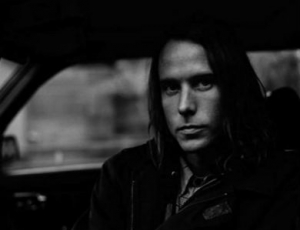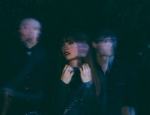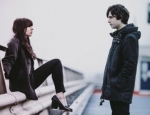Jack Name: It is always important to think for your self, and to be yourself

He collaborated with Ariel Pink, was a touring member of White Fence, while as Jack Name he released his debut record “Light Show” for God?, Drag City's sister label, in which he musically explores the theme of twisted battle between the light and the shadows and where he implicitly criticizes the widespread use of prescription drugs that repress the creativity of younger generations.
His sophomore record “Weird Moon” got released beginning of 2015 by Castle Face Records, label co-runned by John Dwyer of Thee Oh Sees, while the theme of the record is even more eccentric – posthumous trip to space in which the album's protagonists shapeshift into different forms depending on their proximity to each of Jupiter's 67 moons.
His songs are set between grandiose synth-weaved psychedelic tapestries and minimal electro-rock which he, in his own words, describes as “fictional rock 'n roll”. The Zagreb concert is scheduled for 17th June at club Klub. and we got the chance to discuss his work, space travel and other topics.
Hi Jack. How are you doing, are you getting ready for the tour? How do you feel before traveling - nervous or anxious? How are you preparing yourself for the tour?
Jack: I am doing well. Hopefully you are too. I don’t feel nervous or anxious, I’m happy about traveling. All we have to do is bring a few instruments, and a couple clean shirts. We are very lucky people.
The last record deals with concept of metamorphological travel of its protagonists to different planets and its moon in the solar system. Do you think our generation will live to experience travel to other planets in the solar system? Something like you wake up one morning in the future and decide – why wouldn't I travel to Saturn or Jupiter? What will I get to see there? What do you do in space?
Jack: That is a nice idea, but I have a feeling that it will be a long time before we humans grow up enough to allow ourselves to enjoy something like space. Until then, we will probably fight over space, or worry about it, colonize planets for industrial uses, people are still too stupid for space. Maybe one day in the future we will be able to go check it out, but I like it here on earth so I’m not in a rush.
When I think about shapeshifting or changing the form, two concepts come into my mind – shamanism and reincarnation. Shamanism as channeling the all-present but yet unmeasurable or undetectable energy and reincarnation as the concept of soul traveling from one specific form into another. Do you perhaps believe in one of the two concepts? And are you maybe dealing in shamanism in a specific way through your music? As far as I know, the shamans often use music in their ceremonies and rituals..
Jack: I don’t know if I believe in anything, but I think both of these concepts work, there are elements of shamanism and reincarnation in the music and lyrics of this album. You are on the right track.
Nonconformism can relate to many things and happenings and as such is extremely important for the advance of humankind in my opinion, and this is something you also have dealt with. Can you say for yourself that you are a nonconformist? If not in any other way then in music at least?
Jack: It is always important to think for your self, and to BE yourself, there are times when it is difficult to do this, but it is always important. To be an individual is a beautiful thing, and if people waste their individuality, that is very sad.
I don't know if you are familiar with The Olivia Tremor Control.. I personally think they were the key figures back in early 1990's for that can be labelled as lo-fi/experimental rock 'n roll music and scene and that is currently led by bands like Ariel Pink, Teen Daze, Dean Blunt, Axxa/Abraxas and you with your numerous monikers/projects. Have you ever heard about The Olivia Tremor Control and if so, can you relate your music to their work? Are they perhaps one of your music influencers? What are your music and non-music influencers?
Jack: For me personally there is no deep connection with that group. What I have heard, there are some elements that reminded me of early experimental tape music, like Pierre Schaeffer or something, and that music goes back to the 1940s. There is a kind of music, maybe we can say it is a FAMILY of music that has existed for a very long time, people who don’t influence each other, but are all influenced by similar things, perhaps they are sympathetic, without being “influential”. For instance, one of my biggest influences is the Velvet Underground, and they are a huge influence to millions of musicians, the same is true of Crass, or Parliament, or Brian Eno, or Miles Davis, or Harry Partch, or John Cage, or the Residents, or Suicide, or Prince, etc etc. Not all of them liked each others music, or even knew of each other, but they are all part of this bigger family. This is maybe because musicians and artists are really more receptive than creative. Things, “ideas” come through artists into the world. We always say “I got an idea”, but where did we get it from? Who knows? A cosmic place? A holy place? A stupid place? It’s very difficult to really understand the psychology of postindustrial consumer culture music, but I hope that there is something beautiful and interesting underneath it all, like we are all part of the same idea family, and not just apes trying to mimic one another year after year.
You worked with Ariel Pink on his “Pom Pom” record. How did that influence you and your work?
Jack: Back to the family thing again, that was friendship and fun. There was a really amazing environment of people working together to get something done, it seems so simple, it’s hard to explain what was special about it. Ariel really was able to direct people to get what he wanted to get, and he was also able to allow people to be free, to allow new ideas into the picture. There was trust or openness there, both ways, probably because of this “musical family of ideas” that we all belong to. I think this trust and enthusiasm helped to get the best out of everyone involved. That’s a special thing to achieve, so I’m glad I was there to experience it.
You mentioned that LA is an excellent place for make-believe. Why is LA so specific or different than other cities? How does your day at the studio look like or when you are writing and recording new songs and music? How does you typical day in LA look like?
Jack: For me the special thing about LA is the plants and the weather, and the hills. It’s a good place to be alone with your thoughts if you want to, but you can check in with society if you want that too. I write and record in my apartment, so my typical day is to wake up, go outside for a while with my dogs, and then get to work on some recordings. There are beautiful places to visit, parks, rivers, I spend most of my time at those places, or recording at home.
To conclude this interview I would like to point out that this will be your first show in Zagreb and Croatia. What can the local audience expect from your performance? What do you expect from us?
Jack: That is true, and I can’t wait to check it out. Hopefully the show will be nice and loud, so you can feel the music in your guts, and we will be able to create a nice mood for everyone, hopefully it will be dark so that if people want to dance, they will feel comfortable. I expect that we will have a good time, I’m looking forward to it.
Thank you for your time and I have to say that I am looking forward to your performance!



